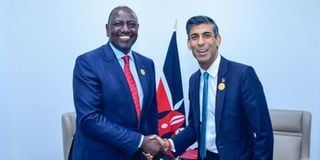Premium
Ruto and UK Premier Sunak meet, agree on Sh500bn climate change deals

President William Ruto (left) and UK Premier Rishi Sunak.
President William Ruto has met with UK Premier Rishi Sunak on the sidelines of the COP27 climate summit in Sharm-el-Sheik, Egypt.
In a statement following their meeting, the British High Commission on Kenya revealed that the two leaders have inked a deal to fast-track British investment projects worth Sh500 billion that will support Kenya’s leadership on climate change.
The deal spans projects in green energy, agriculture and transport.
"These new, clean and green investments will become flagship projects of the UK-Kenya Strategic Partnership – an ambitious five-year agreement that is unlocking mutual benefits for the UK and Kenya," the statement said.
The projects under the deal include a new geothermal and solar energy generation in Menegai and Malindi, as well as a Sh425 billion Public Private Partnership to deliver the Grand High Falls Dam. The statement said the latter will "generate a gigawatt of renewable power and provide an area over twice the size of the Maasai Mara with drought-combating irrigation solutions".
Others are a green regeneration of Nairobi anchored around a new central rail station and a Sh32 billion investment in a climate-resilient agriculture hub for the Lake Victoria region.
"The UK government will commit Sh2 billion to a new guarantee company that will lower investment risk and unlock Sh12 billion of climate finance for Kenyan projects over the next 3 years, through collaboration with CPF Financial Services and other private investors," the High Commission said.
PM Sunak "praised Dr Ruto’s pioneering climate leadership" and urged Kenya to continue along the path of green growth, the statement said.
President Ruto is today expected to address the world’s biggest climate meeting as Africa yesterday suffered a major heartbreak on day one of the two-week conference.
Yesterday, delegates from all over the world attending the 2022 United Nations Climate Change Conference (COP27) were informed that an agreement had been reached after intense negotiations to have loss and damage as an agenda to discuss whether polluting rich nations should compensate poor countries, who are the most vulnerable to climate change, for their suffering but “no later than 2024”.
The development comes after last year’s COP26 meeting in Glasgow when high-income nations blocked a proposal for a loss and damage financing body and instead backed a three-year dialogue for funding discussions.





